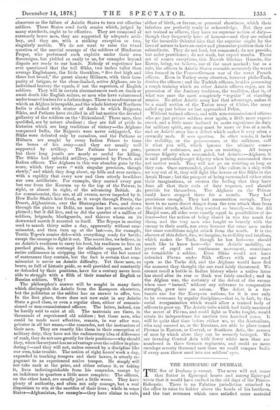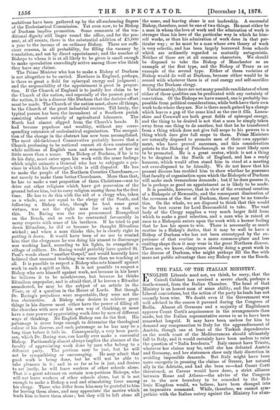an indolence in quarters a little more complete. The officers,
that flutter in Episcopal hearts and among Episcopal on the other hand, are usually just a little worse. They have wives that it would have excited in the old days of the Prince- plenty of authority, and often not only courage, but a real Bishopric. There is no Palatine jurisdiction attached to disposition to win at the sacrifice of their lives ; while in some the office to raise its holder above the heads of his brethren, States—Afghanistan, for example—they have claims to rule, and the vast revenues which once satisfied more material ambitions have been gathered up by the all-embracing fingers of the Ecclesiastical Commission. Yet even now, to be Bishop of Durham implies promotion. Some remnants of the tra- ditional dignity still linger round the office, and for the pre- sent, at all events, there is the substantial addition of £3,000 a year to the income of an ordinary Bishop. These are suffi- cient reasons, in all probability, for filling the vacancy by translation, and not by direct appointment; and the number of Bishops to whom it is at all likely to be given is small enough to make speculation exceedingly active among those who think they have any claims.
The Prime Minister who has to make a Bishop of Durham is not altogether to be envied. Nowhere in England, perhaps, is there so great a field for episcopal energy and judgment ; and the responsibility of the appointment is great in propor- tion. If the Church of England is to justify her claim to be the Church of the nation, and especially of the poorest part of the nation, it is in a diocese like Durham that the decisive effort must be made. The Church of the nation must, above all things, be the Church of the great industrial centres. Till lately, the typical parson has been the incumbent of a Southern parish consisting almost entirely of agricultural labourers. The North had almost slipped from the Church's hands. It had become populous and wealthy, without any corre- sponding extension of ecclesiastical organisation. The recogni- tion of the change in the abstract has now been accomplished.
The most old-fashioned Conservative probably knows that a Church professing to be national cannot sit down contentedly while millions of English men and women know of her as little more than a name. The Bishop of Durham, if he is to do his duty, must enter upon his work with the same feelings which might animate a General who has to subjugate a pro- vince in which his Sovereign's title is still disputed. He has to make the people of the Northern Counties Churchmen,— not merely to make them better Churchmen. More than that, he has to make a vast proportion of them Christians—not to drive out other religions which have got possession of the ground before him, but to carry religion among them for the first time. He has to do this with the aid of a clergy who, taken as a whole, are not equal to the clergy of the South, and following a Bishop who, though he had some great .virtues, was not the right man for such a task as this. Dr. Baring was the one pronounced Evangelical on the Bench, and as such he contrasted favourably in many respects with some of his brethren. If he tried to put down Ritualism, he did so because he thought Ritualism wicked ; and when a man thinks this, he is clearly right in putting it down. It would have been of no use to remind him that the clergyman he was doing his utmost to discourage was working hard, according to his lights, to evangelise a village of colliers. Dr. Baring would probably have quoted St. Paul's words about "another Gospel," and would honestly have believed that unsound teaching was worse than no teaching at all. It is possible to respect a Bishop who sets himself against work in such a spirit as this. It is not possible to respect a Bishop who sets himself against work, not because in his heart he believes it to be mischievous, but because he thinks Ritualism unpopular, and is afraid that, if he leaves a Ritualist unmolested, he may be the subject of an article in the Times, or of a question in the House of Lords. But though Dr. Baring's prejudices were respectable, they were not the less obstructive. A Bishop who desires to achieve great things in his diocese must either have the power of filling all the churches with men of his own way of thinking, or must have a rare power of appreciating work done by men of different ways of thinking. No English Bishop can do the first. His ,patronage is never large enough to determine the theological colour of his diocese, and such patronage as he has may be a long time before it falls in. Consequently, a very keen parti- san, which Dr. Baring was, can hardly ever make a successful Bishop. Partisanship almost always implies the absence of the faculty of appreciating work done by men who belong to a different party. The partisan may be just, but he will not be sympathising or encouraging. He may admit that good work is being done, but he will not be able to take pleasure in it ; and in so far as he is just, and desires to act justly, he will leave workers of other schools alone. That is a great advance on certain non-partisan Bishops, who will not leave workers of other schools alone, but it is not enough to make a Bishop a real and stimulating force among his clergy. Those who differ from him may be grateful to him for leaving them alone, and may appreciate the motive which leads him to leave them alone ; but they will be left alone all the same, and leaving alone is not leadership. A successful Bishop, therefore, must be one of two things. He must either be a man in whom the love of work and the admiration of work is stronger than his love of the particular way in which he him- self works, or than his admiration of work done in that par- ticular way ; or he must be a man whose own theory of work is very eclectic, and has been largely borrowed from schools which are ordinarily regarded as mutually antagonistic. Neither of these are at all common characters. We should be disposed to take the Bishop of Manchester as an example of the first type, and the Bishop of Truro as an example of the second type. Either of these varieties of Bishop would do well at Durham, because either would be in accord with whatever there is of real energy and self-sacrifice among the Durham clergy.
Unfortunately, there are not many possible candidates of whom either of these qualities can be predicated with any certainty of conviction. Of the Bishops we have named, one is probably im- possible from political considerations, while both have their own work to do where they are. Nor is there much gained by a change which leaves a gap of the same kind as the one it fills. Lanca- shire and Cornwall are both great fields of episcopal energy, and the thing to be desired is not that a man be simply taken away from one thing to do another, but that he be transferred from a thing which does not give full scope to his powers to a thing which does give full scope to them. Prime Ministers are naturally disposed to promote men of their own appoint- ment, who have proved successes, and this consideration points to the Bishop of Peterborough as the most likely man to be promoted. He is a great orator, which is not a thing to be despised in the North of England, and has a ready humour, which would often stand him in stead at a meeting not over-disposed to be friendly. We do not know that his present diocese has enabled him to show whether he possesses that faculty of organisation upon which the Bishopric of Durham will make such tremendous demands ; but if he does possess it, he is perhaps as good an appointment as is likely to be made.
It is possible, however, that in view of the eventual creation of a Bishopric of Newcastle, and the consequent diminution of the revenues of the See of Durham, there may be no transla- tion. On the whole, we are disposed to think that this would be the best course for Lord Beaconsfield to take. The vast body of the Clergy supplies a very much larger field from which to make a good selection, and a man who is raised at once to a Bishopric enters upon the work with a keener feeling that he has his spurs to win. There is necessarily so much routine in a Bishop's duties, that it may be well to have a Bishop of Durham who has not been stereotyped by the ex- perience of that routine in a more common-place and less exalting shape than it may wear in the great Northern diocese. There are, we know, clergymen already doing a great work in the diocese of Durham, who might perhaps 611 the See with more net public advantage than any Bishop now on the Bench.







































 Previous page
Previous page